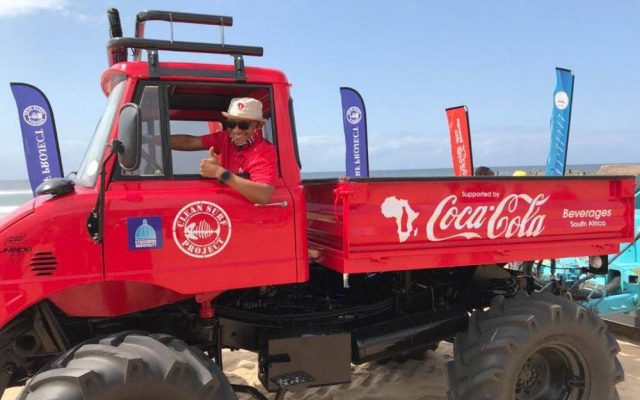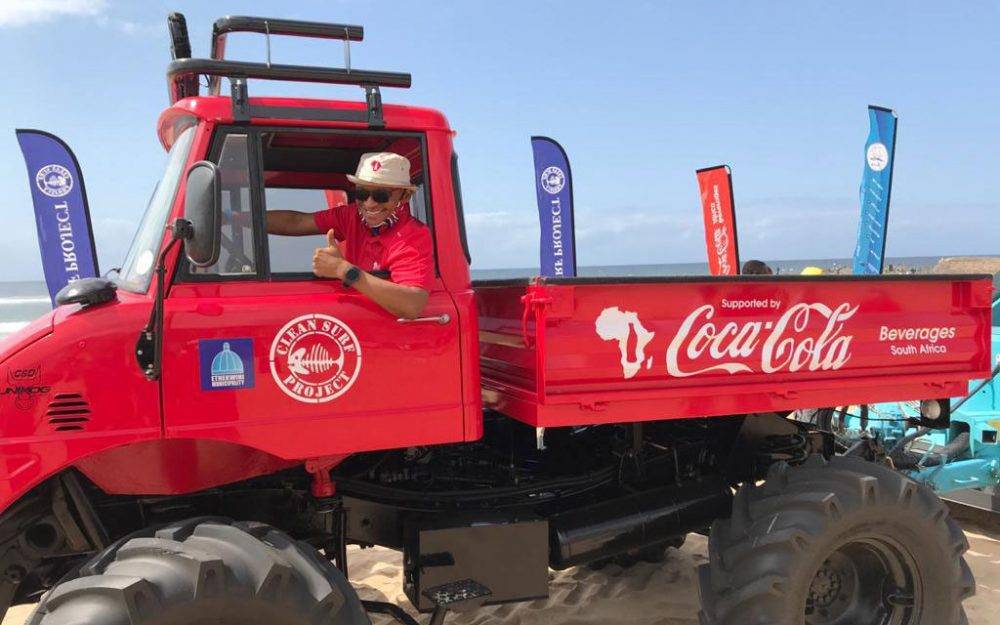

The goal is for every package to have more than one life
A world without waste is possible. It requires deliberate action, commitment, and critical mass to make it a reality.
We all know that food and beverage packaging is an important part of our modern lives and has enabled the seamless delivery of goods, but it has created a packaging problem that’s impacting our planet negatively. A lot of plastic waste ends up in landfills and our oceans and is harmful to marine life. We all have a responsibility to help do something and manage and collect waste to protect our environment.
Tackling the global plastic waste crisis requires cross-sector collaboration and alignment on common principles and targets. Coca-Cola Beverages South Africa (CCBSA) works with a range of stakeholders at a regional and local level. This includes partnering with government and community organisations to strengthen recycling infrastructure and boost collection rates, collaborating with customers, peers and industry associations to shape public policy that supports a circular economy; and teaming up with suppliers, start-ups and R&D partners to fuel sustainable packaging innovation.
September was National Clean-up and Recycle month in South Africa, where communities, the business community, and different spheres of government come together to clean up the environment by collecting waste. South Africa marked National River Clean-up Day (13 September), National Recycling Day SA (15 September), and International Coastal Clean-up Day and World Clean-up Day (both falling on Saturday, 16 September) as opportunities to make a visible impact on our environment and to help spread the message and advocate for the importance of addressing waste and reducing pollution.
CCBSA has the following plastic waste goals in South Africa:
Help collect a bottle or can for every one we sell by 2030
Focus on making all our packaging 100% recyclable by 2025
Have 50% recycled content in our packaging by 2030 and make 25% of our packaging reusable (returnable) by 2030.
To address the plastic waste problem means taking a holistic view on how plastic packaging is designed, collected and ultimately recycled. This is why CCBSA is committed to leveraging technology and investing in systems to come up with innovative designs that will help make the world’s packaging problem a thing of the past.
While using more recycled content in packaging is important, it is critical that we markedly increase the collection of post-consumer waste and prevent it from ending up in lakes, rivers and oceans. This requires a broader public awareness to help shift consumer behaviour to collect and recycle at source. After all, no plastic bottle disposes of itself on the ground.
We are bringing people together through programmes like beach and river clean-ups and other ongoing initiatives to encourage more people to recycle as often as they can. We are investing in community and educational programmes to help people understand what to recycle, how to recycle and where to recycle. We also work hand-in-hand with local communities, NGOs, industry and other key stakeholders to shift mindsets and positively influence positive behaviour around this critical issue.
But this is not a challenge that one company, industry or government can solve on their own. It requires a whole-of-society approach that results in a massive change in the way people think about plastic waste.
Shared opportunity
South Africa is facing a youth unemployment crisis. According to a recent Statistics SA Report, South Africa’s unemployment rate came at 32.6% in the second quarter of 2023, slightly lower than the previous period’s 32.9%.
The opportunity lies in connecting unemployed youth in the informal economy to the recycling industry.
Plastic has value. When it comes to creating shared opportunity, we see significant potential in establishing and scaling up a circular economy for plastic waste. This has the added benefit of helping to address the plastic waste problem while also generating employment opportunities in the plastic waste value chain.
The circular economy promotes the re-use and recycling of products and materials, creating a closed-loop system that minimises waste and pollution. This offers a unique opportunity to address post-consumer plastic waste in South Africa by keeping plastics in use and out of the environment.
Our country has a large informal economy, which includes a vast network of waste pickers who collect and sort recyclable materials, creating a key component of a circular economy for plastic waste that generates employment opportunities and income, while reducing plastic pollution.
Integrating waste pickers into the waste collection value chain by providing training and equipment — resulting in a more reliable income stream — can improve their working and living conditions and increase economic opportunities for marginalised communities.
At the same time, facilitating incentives for consumers, industry and communities is critical in any circular economy.
The opportunity and incentive to grow employment, particularly among the youth, through a circular economy for plastic waste is clear.
Design, collect, partner
As part of the Coca-Cola system in South Africa, our commitment is to invest in our packaging, to help make the world’s packaging problem a thing of the past. This forms part of the Coca-Cola Company’s sustainable packaging initiative called World Without Waste, which we launched in 2018.
We are reimagining our packaging to make it better for our planet and our business. We are working to design better bottles because we believe that packaging shouldn’t harm our planet, and if someone wants to recycle one of our packages, they should be able to.
Through various design innovations, we are increasing the recycled content in our bottles, and increasing their ease of recyclability.
We are also expanding our innovative refillable PET (RefPET) bottles, which we launched in 2019, and have developed beverage bottles made from 100% plant-based plastic.
For instance, our 500ml Bonaqua bottles are made out of 100% recycled PET (rPET). Other recent highlights include the move to clear Sprite PET, which makes it much easier to recycle and has greater value as a recyclable material.
The second pillar of our World Without Waste strategy is collection. As one of the Coca-Cola Company’s bottlers, we are leading the industry to help collect and recycle a bottle or can for every one we sell by 2030.
We are playing our part and working hard to bring people together to help us collect and recycle 100% of our packaging. Regardless of where it comes from, we want every package to have more than one life, and this is where the Extended Producer Responsibility (EPR) model plays a key role. EPR means that producers of packaged goods are responsible not only for health and safety issues associated with their products, but also for the management of their post-consumer packaging waste, including collection, sorting and recycling.
Working together to clean up our environment
We are partnering with communities and industry to clean up existing packaging. We are bringing people together through programmes like the International Coastal Clean-up which brings hundreds of volunteers together to participate in beach and river clean-ups around the country.
On International Coastal Clean-up Day, on 16 September, over 100 CCBSA employees and a number of volunteers collected a large amount of waste from beaches and river systems in the Eastern Cape and KwaZulu-Natal. The clean-ups were in partnership with local municipalities.
We are working hard to change mindsets, by creating and supporting waste collection and recycling systems across our footprint where they didn’t exist and increasing collection and recycling rates where such systems do exist.
We recognise the importance of supporting the total collection value chain,, from waste picker level to buy-back centres and recyclers.
Understanding that we can’t do this alone, we are committed to partnering with like-minded entities to shape policy, leverage our combined scale, and work towards a world without waste.
For more information about the bottler’s collaboration with The Coca-Cola Company’s World Without Waste strategy by 2030, click on https://www.coca-cola.co.za/sustainability/world-without-waste
The post CCBSA, local communities join forces to help create a World Without Waste appeared first on The Mail & Guardian.
The goal is for every package to have more than one life
The post CCBSA, local communities join forces to help create a World Without Waste appeared first on The Mail & Guardian.




